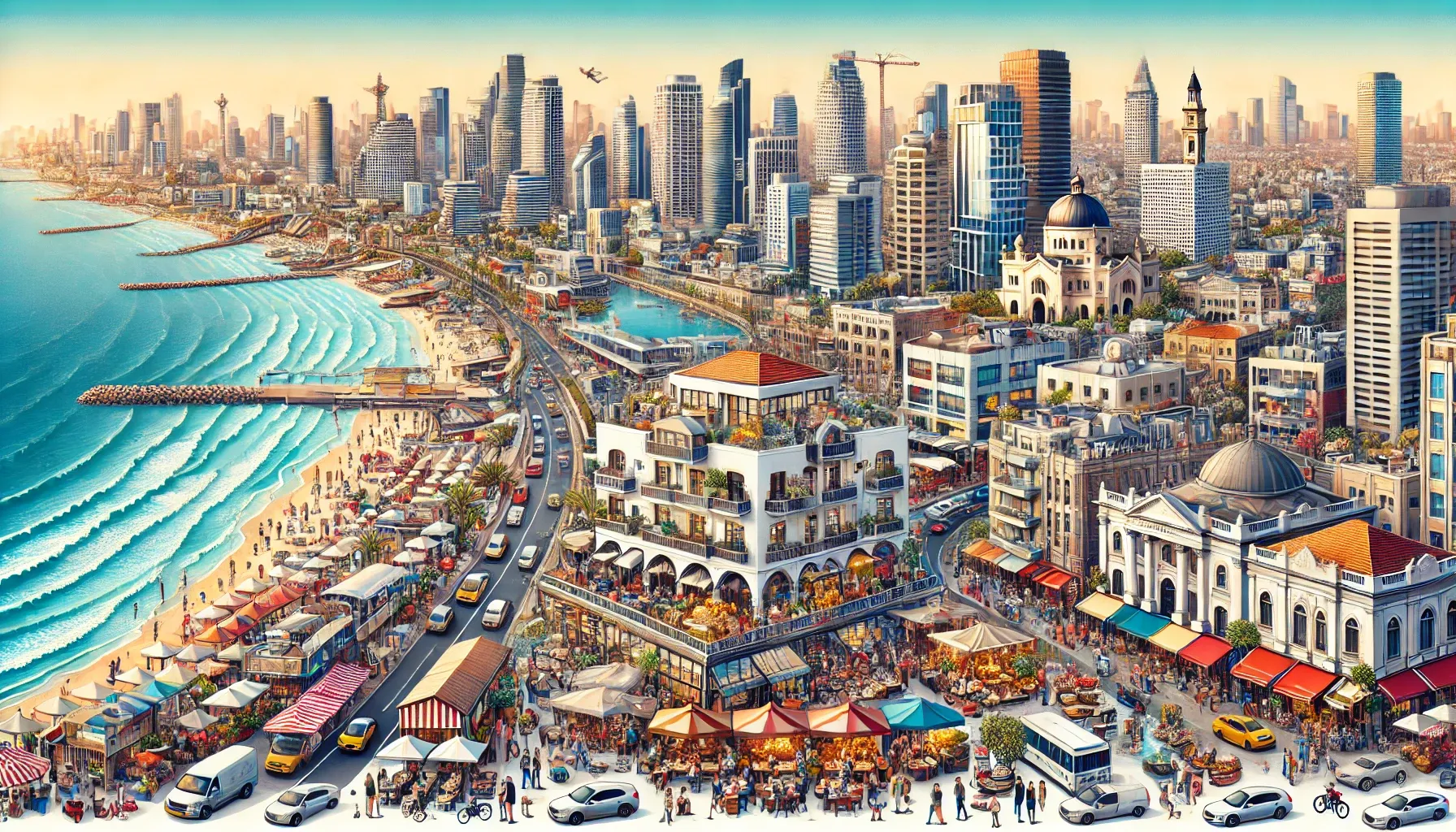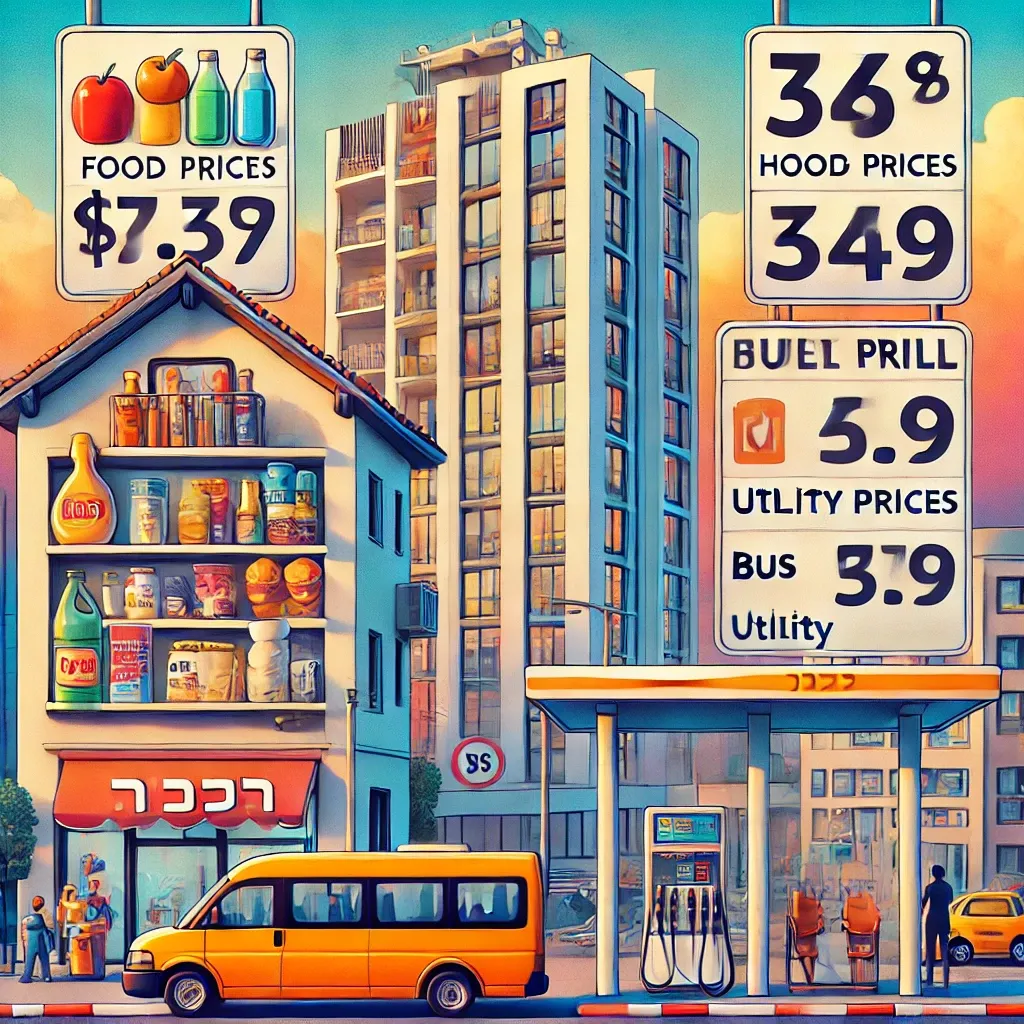Cost of living in Israel

- The real cost of living in Israel
- Prices for goods and services in Israel
- Housing and Education in Israel: Opportunities and Reality
- Prices and services in Israel
Cost of living in Israel
Israel is a country with a high cost of living that varies depending on the place of residence. In major cities, housing and food expenses are higher than in remote settlements. According to the Mercer index from 2014, Tel Aviv ranks among the top cities for cost of living, even surpassing Paris andMilan.
In 2012, Tel Aviv was recognized as the most expensive city in the Middle East.
Factors influencing the cost of living
The biggest expenses for residents of Israel are rent, especially in large cities like Tel Aviv. Salaries are lower than in other European countries, but tax benefits and other assistance programs offset this factor. High import taxes and excise duties increase the cost of goods, making international brands in Israel more expensive than in other countries.
National currency and income level
The national currency of Israel is the shekel, and the average salary in the country is about 9,500 shekels or 2,500 US dollars. When comparing the cost of living in Israel and Moscow, it is worth noting that it is 15% cheaper in the Russian capital than in Jerusalem.
Food prices and quality of life
Prices for groceries in Israel vary depending on whether they are purchased in a store or at a restaurant. Prices for fresh fruits and vegetables are quite affordable, especially considering the possibility of bargaining. The quality of food in Israel is higher than in many other countries, which is worth noting when comparing prices.
The average price of a basic grocery basket in Israel.
According to information from the international portal Numbeo, the prices are as follows: a liter of milk is priced at approximately 6.05 shekels ($1.6), fresh white bread costs around 6.87 shekels ($1.74 per loaf), a kilogram of rice is about 8.39 shekels ($2.2), a dozen eggs is around 12.79 shekels ($3.4), a kilogram of local cheese is approximately 45.5 shekels ($12), chicken fillet costs about 30.78 shekels ($8.13), and fruits like apples or oranges will cost 6-8.5 shekels per kilogram ($1.6-2.2). Vegetables, such as tomatoes and potatoes, are priced at approximately 4.3-5 shekels per kilogram ($1.15-1.3), while a 1.5-liter bottle of water is about 4.64 shekels ($1.23). A bottle of local wine will cost 40 shekels ($10.5), half a liter of local beer is 9.55 shekels ($2.5), and 0.33 liters of imported beer is 12.71 shekels ($3.4). A pack of Marlboro cigarettes costs around 32 shekels ($8.45).
Prices for lunch and dinner
Lunch at an inexpensive restaurant or fast food will cost around 45-50 shekels ($11.8-$13.2), while dinner for two at a mid-range restaurant is about 200 shekels ($53). In a café, a half-liter of local beer or 0.33 liters of imported beer costs 25-27 shekels ($6.6-$7.1).
Prices for clothing and entertainment
A pair of Levi's jeans costs about 340 shekels ($90), a summer dress from Zara or H&M about 212 shekels ($56), and men's Nike sneakers about 430 shekels ($113.5). A fitness club membership costs an average of 250 shekels a month ($66), an hour of tennis court rental on the weekend costs about 52 shekels ($13.7), and a movie ticket costs about 40 shekels ($10.5).
Prices for communications and entertainment
A minute of prepaid mobile traffic is priced at 0.36 shekels ($0.09), while an unlimited internet connection costs about 78.58 shekels per month ($20.75).
The cost of housing in Israel
The cost of housing in Israel varies significantly depending on the location. In recent years, property prices have risen considerably, leading to an increase in the share of rentals among local residents. Interest from foreign investors has also impacted the Israeli real estate market. Despite the rising prices for purchasing homes, rental rates have remained relatively stable.

Long-term rentals in Israel
Long-term rental prices for housing in Israel vary depending on the location. For example, in Tel Aviv, renting a one-bedroom apartment in the city center during the off-peak season averages around 4,500 shekels per month (about $1,188).
29 January
9 October 2024
9 October 2024
29 September




Education in Israel
Education in Israel is characterized by an informal approach, where students and teachers often address each other by their first names. Schools place a strong emphasis on mathematics, sciences, and the study of foreign languages, while kindergartens focus primarily on developing children's creative and emotional abilities through play-based methods.
Children's institutions in Israel
Childcare is quite expensive; for example, in "daycare centers" for children under three years old, the cost can reach 2,385 shekels per month (about $630). After the age of three, children can be sent to a public kindergarten for a monthly fee of 973 shekels (about $257), where they spend six days a week for six hours a day.
School education in Israel
School education from ages 5 to 17 in Israel is free and compulsory. Textbooks and other school supplies are purchased at the parents' expense. Instruction is conducted in Hebrew, which requires foreign children who do not know the official languages (Hebrew and Arabic) to attend private schools.
International schools and universities
International schools are located in Tel Aviv and Jerusalem and offer educational programs based on British, American, or French systems. The tuition fee at public universities is approximately 10,000 shekels per year (about $2,714). In private institutions, the tuition is significantly higher, reaching around 32,500 shekels per year ($8,571).
Educational opportunities in Israel
So, despite the high cost of real estate and education, Israel offers a wide range of opportunities for education and development for both national and international students and their families.
Prices for cars and fuel in Israel
Volkswagen Golf cars in Israel are sold for around 130,000 shekels, which is approximately $35,000. In Russia, however, the same car costs only $16,300. Fuel prices are constantly rising in Israel due to a huge 90% tax, making the average cost of a liter of gasoline 6.88 shekels (about $1.8).
Public transport in Israel
Many locals and tourists prefer to use public transportation in Israel to get around the country. The prices for intercity buses or trains depend on the distance and direction. A ticket within the city costs 6.9 shekels (about $1.8), while a monthly pass will cost around 250 shekels ($66).
Taxi and its cost
A costly taxi ride between cities can be an optimal option for a family or a large group. The fare for getting into a taxi is 12.6 shekels ($3.3), and each kilometer traveled will cost an additional 5 shekels ($1.3).
The level of healthcare in Israel
Healthcare in Israel is at a very high level, comparable to that of developed countries around the world, including the USA and most Western European countries. Doctors are highly qualified and speak English, making Israel one of the leading destinations for medical tourism.
Medical insurance and its financing
Funding for the Israeli health insurance system is provided through a health insurance tax, which is deducted from foreigners working in the country (ranging from 3% to 5.5% up to 16% of their salary). This tax is the primary source of funding for the healthcare system in Israel.
Article on the features of the budget in Israel
Food prices in Israel are relatively affordable if you eat at home, but quite high if you dine out. Fresh fruits and vegetables are inexpensive, and since haggling is common in Israel, buyers can expect significant discounts. According to information from January 2014, food prices in Israel were 19% higher than in any of the 34 OECD countries.
- Milk (1 L) – ILS 6.05 ($1.6)
- A loaf of fresh white bread – ILS 6.87 ($1.74)
- Rice (1 kg) – ILS 8.39 ($2.20)
- Eggs (12 pcs) – ILS 12.79 ($3.4)
It's important to know:A meal at an inexpensive restaurant or fast food establishment will cost around ILS 45-50 ($11.8-$13.2), while a three-course meal for two at a mid-range restaurant will cost about ILS 200 ($53).
Clothing, entertainment, communication
A pair of Levi's jeans costs ILS 340 ($90), a summer dress (ZARA, H&M) is ILS 212 ($56), and men's leather shoes or Nike sneakers will set you back ILS 430 ($113.5).
- The cost of a fitness club membership for one adult is about ILS 250 ($66) per month.
- Hourly rental of a tennis court on a weekend – ILS 52 ($13.7)
Rental and maintenance of real estate
Bills for municipal tariffs and taxes (Arnona) are sent to property owners every two months, and for an apartment with an area of 100 square meters, they can range from ILS 500 to ILS 2000 ($132-$528).
It's important to remember:The average utility bill is ILS 644 ($170), which includes payments for electricity and water supply, heating (gas), and garbage collection.
Comment
Popular Posts
9 October 2024
9940
9 October 2024
1485
29 September
377
Popular Offers

Subscribe to the newsletter from Hatamatata.com!
Subscribe to the newsletter from Hatamatata.com!
I agree to the processing of personal data and confidentiality rules of Hatamatata








